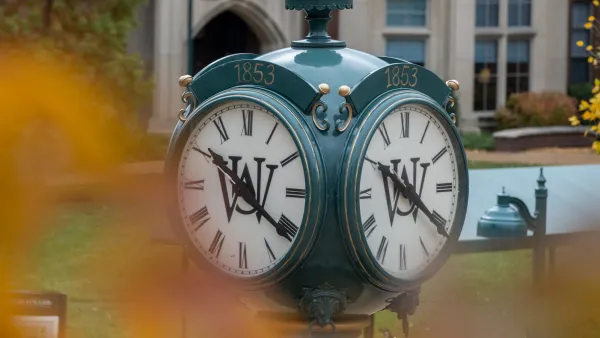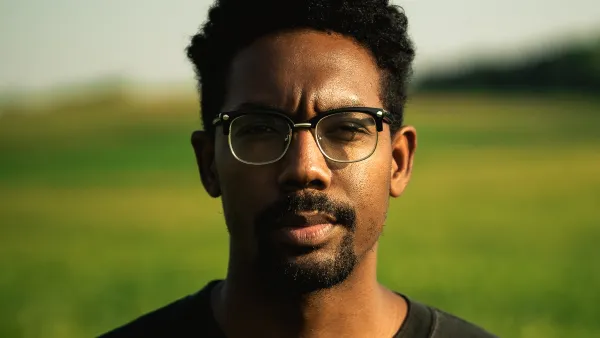Graduate and undergraduate students in the humanities and humanistic social sciences at WashU gained a new champion this semester, as Meredith Kelling joined the Center for the Humanities as assistant director for student research and engagement. The native St. Louisan earned a doctorate from the university’s Department of English in 2021 and held pre- and postdoctoral positions that amplified her sense of service to the humanities and the people who engage with its disciplines. With barely a month under her belt, Kelling talks about her new role, her background and how she sees the relationship between the public and the practice of humanities.
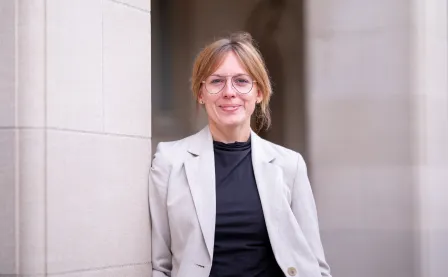
Your position, assistant director for student research and engagement, is a complete revamp and expansion of an earlier staff role. What will you be doing in the center? Are you working with both undergraduate and graduate students? What are your overarching goals?
Mine is a totally new position, which reflects an update in the humanities center’s mission to support the humanities on campus and in our community. Our director, Stephanie Kirk, is motivated to expand on the center’s initial vision of supporting the humanities through faculty research and teaching to include more initiatives for graduate and undergraduate students. Right now, a lot of what I’m doing is exploratory. I’ve been researching humanities programs and centers like ours on other campuses to see what’s been working for them; diving into the data on how students can be drawn to and retained within humanities projects and concentrations; and talking to students, instructors and administrators about the humanities at WashU. I want to get a 30,000-foot view of things while also staying close to the granular details that make our particular humanities ecosystem at WashU so unique and wonderful.
I will be working with both undergraduate and graduate students, which is something I’m really excited about because the two populations present such distinct challenges, but together tell us such interesting things about how humanities work in our world.
I will be working with both undergraduate and graduate students, which is something I’m really excited about because the two populations present such distinct challenges, but together tell us such interesting things about how humanities work in our world. For example, undergraduates are often inundated, before they even get to WashU, with misinformation about the utility of a humanities degree beyond college. It makes perfect sense to me that a parent would suggest their child go into a major that points directly toward a high-paying career, and our society thinks that professional and engineering schools are “safe bets” in that regard, but the data doesn’t bear that out. The critical thinking and analytical skills that humanities majors develop in coursework and research increase their value as contributors and leaders in a variety of post-college career outcomes. But beyond the dollars and cents, the humanities afford students the opportunity to discover themselves and their places within an incredibly complex world. My goals for now are to identify crucial points in the undergraduate experience where the center might collaborate with other functions on campus — including admissions, student affairs, undergraduate research, advising and career services — to help undergraduates make informed decisions about choosing humanities courses, programs, research opportunities and careers.
When it comes to graduate students, of course, I was very recently a WashU graduate student, so I want to carry forward my own experiences while learning as much as I can about what grads are invested in now. We are within this interesting moment when job prospects for humanities PhDs are frighteningly low, but only in the most traditional sense. There are other ways of sharing your expertise with others, especially if we’re thinking about the world beyond campus.
Speaking anecdotally, it’s much more common these days for first-year PhD students to say they want to go into fields beyond academia, which I think is a major step in the right direction. It’s not just that grad students see the hiring trends in their fields and are working on contingency plans. They’re thinking about other ways they can use expertise and methods to contribute to the world. I think that turn is incredibly exciting. I’m already so heartened by the ways that WashU departments and administrators have stepped up in the last few years to support these evolutions in higher education, but we can and must do more to support and empower graduate students. They are not the next generation of academic workers; they are already at work, now. I want to center the experiences of current graduate students in any collaborative or signature efforts we undertake, at the humanities center, to support graduate student research and career development.
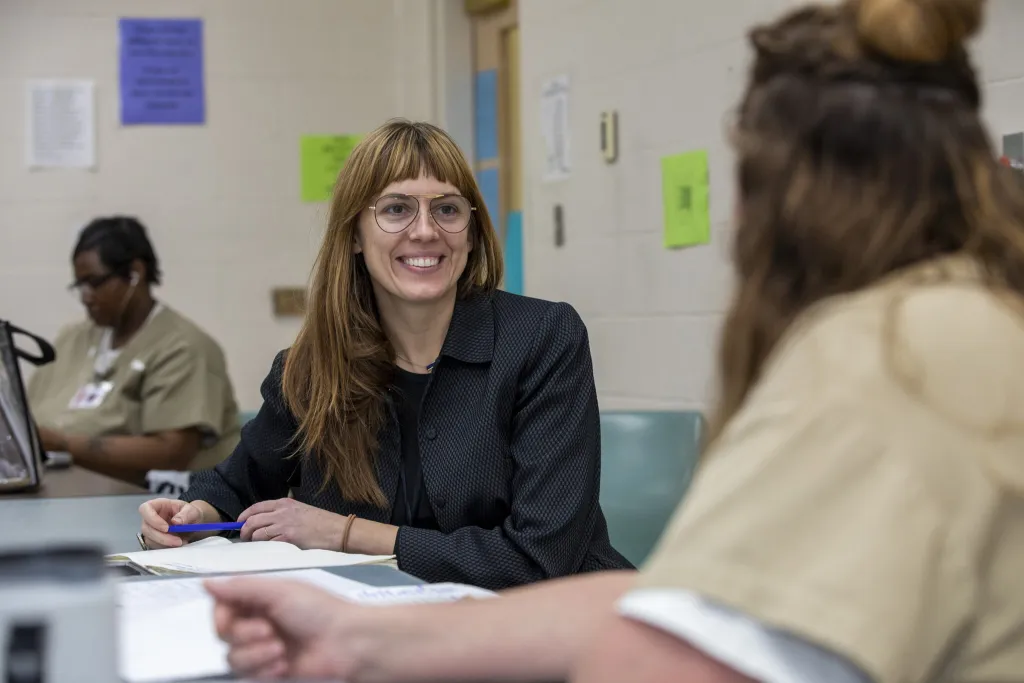
You come to the humanities center most recently from the Washington University’s Prison Education Project. What did you do during your postdoctoral appointment there?
When I started in the postdoc position, PEP had recently implemented its program at the Women’s Eastern Reception, Diagnostic, and Correctional Center in Vandalia, Missouri, a cool hundred miles from the main WashU campus. My primary role was to oversee that process and teach courses in writing and literature. PEP has been running a wonderfully robust program at the Missouri Eastern Correctional Center in Pacific, Missouri, for nearly a decade. This newer program was much smaller. When I started, we only offered two courses and a reading group per semester, but by the time I left this summer we had admitted 20 new students and more than doubled the course offerings.
One thing I’m always telling people about working in higher ed in prison is that there was essentially no boundary between the intellectual labor of teaching and the logistical challenges of program development in a prison. There’s so much strategizing involved in both. My training in the humanities — both the content of my studies and the skills in communication and planning that one develops in the course of pursuing a PhD — really prepared me well for that job. Learning how to connect with audiences beyond our main campus is the most essential skill to develop as a humanist. It doesn’t seem coincidental that several of PEP's core team throughout the years — the late Maggie Garb, Jami Ake, Trevor Sangrey, Barbara Baumgartner, Robert Henke and Kevin Windhauser — all have PhDs in humanities fields and have leveraged their skills and knowledge into this astounding work.
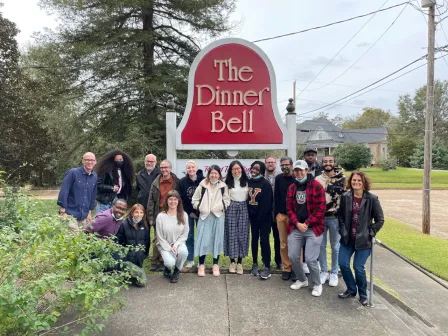
You were also the predoctoral planning fellow with Freedom | Information | Acts, a WashU StudioLab funded through the humanities center by a Mellon Foundation grant. How did that experience influence your trajectory?
Our project was rooted in analyzing the relationship between information and freedom. The project we pulled together — to think about the history and historiography of the civil rights movement as a way of understanding both the phenomenon of U.S. mass incarceration and the means by which its harms can be repaired through education — was an ambitious one. We wanted to test what could happen when you enabled an encounter between incarcerated people, whose means of access to information is limited as a form of punishment, and an archive.
The other piece of this project that influenced my trajectory was my role within the StudioLab’s working group. As the grad student on a crack team of faculty and staff, I had to learn how to balance deferral to experts — in archival method, in pedagogy, in the actual content of the course — with the sense that what we were trying to do was innovative even on the level of classroom activity and course structure. I got loads of information on various functions and roles within the academy while also learning more about how we all might work together to innovate on what it is that we already do well.
Both of those appointments foreground public humanities and access to humanities education. What pulled you in that direction?
For me, the public humanities is about two things: increasing access to knowledge and methods of inquiry, and recognizing wisdom beyond the traditional academic model. My passion for the humanities has always been rooted in an instinct for justice. I’ve begun to think that this is a natural consequence of being raised in a society such as ours, where higher education is valued as an unequivocal moral good while also being prohibitively expensive for so many. When I was in college, I didn’t feel like I deserved to be there more than the people I knew who couldn’t afford it. Because I worked a lot in college, waiting tables and tending bar, I knew tons of people who were also smart and who had deep intellectual and creative commitments, but who weren’t “college material” simply because the traditional college experience simply didn’t fit into their lives. I think the dissonance of that experience, which I know is a common one for undergrads, really makes students ask themselves hard questions: Is this all worth it, and how? What good is it going to do?
Humanities questions are crucial to every lived experience, and humanities knowledge is essential for attaining awareness of one’s place in community and in history. So long as educational opportunities are unequally parceled at birth, we need to be thinking ... about how we will share and develop our resources and our knowledge with the broader world.
I think there’s no moral value to a college education. Some of us are lucky enough to be able to knock out four years of a bachelor’s degree by 22, but most people have to be much more resourceful to get the same thing, and some people just aren’t going at all. And yet, humanities questions are crucial to every lived experience, and humanities knowledge is essential for attaining awareness of one’s place in community and in history. So long as educational opportunities are unequally parceled at birth, we need to be thinking, quite constantly, about how we will share and develop our resources and our knowledge with the broader world. For me, every humanities project prompts two questions of its scholar: First, how are you going to share this with the world? And second, when you let the world in, what more are you going to learn about what you thought you already knew?
